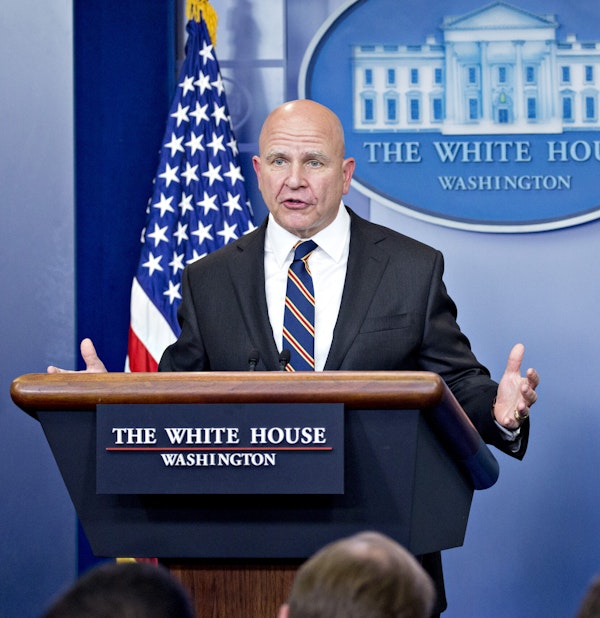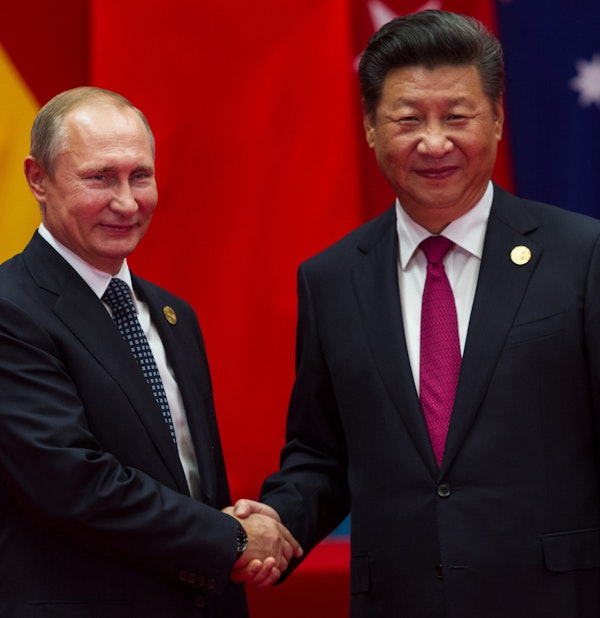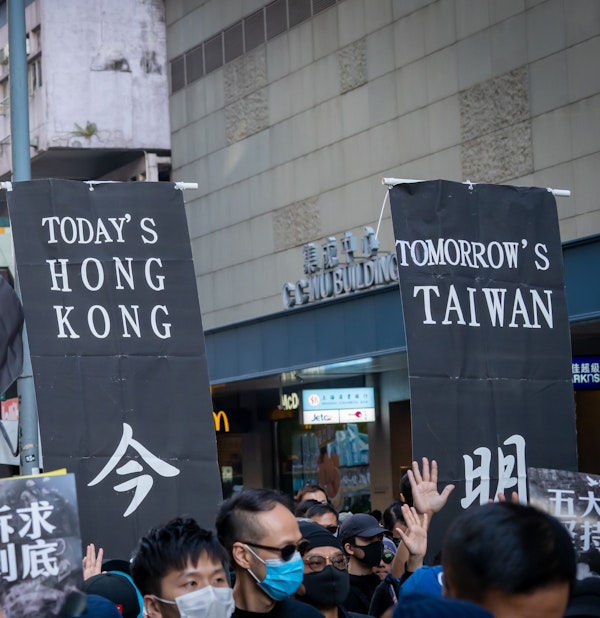Competitive Engagement Key to Defending America
As National Security Advisor, Lt. General McMaster examined threats from across the globe, including China. He explains how the U.S. must engage with the authoritarian regime to maintain American security, prosperity, and influence.
 H.R. McMaster speaks during a White House press briefing in Washington, D.C., U.S., on Thursday, Nov. 2, 2017. (Andrew Harrer/Bloomberg via Getty Images)
H.R. McMaster speaks during a White House press briefing in Washington, D.C., U.S., on Thursday, Nov. 2, 2017. (Andrew Harrer/Bloomberg via Getty Images)
Lieutenant General H.R. McMaster served as U.S. National Security Advisor to President Donald Trump from 2017-2018, a role that shapes decision-making and strategy in American foreign policy.
In his new book, Battlegrounds: The Fight to Defend the Free World, McMaster writes about his time in the White House and examines U.S. foreign policy since the end of the Cold War, particularly with hostile and complex states including Iran, North Korea, the Middle East, Russia, and China.
He sat down with Bush Institute Executive Director Holly Kuzmich to discuss Battlegrounds and share his firsthand perspective on the complicated relationship between the U.S. and China. Below are excerpts from their discussion, which has been edited for length and clarity.
Following the Cold War, what happened to allow China to rise to its current place on the world stage?
After the Cold War, we had reason to be optimistic. We had just won, the Soviet Union collapsed, and we demonstrated our military prowess as well during the 1991 Gulf War. But I think this period of over-optimism led to the widespread acceptance of some fundamentally flawed assumptions about the post-Cold War world. Among those was this idea that an arc of history had guaranteed the primacy of our free and open societies over closed authoritarian systems.
The China corollary to that was that China, having been welcomed into the international order, would play by the rules, and as it prospered, would liberalize its economy and eventually liberalize its form of government. And of course, none of that turned out to be true. We clung to that assumption for far too long.
This period of over-optimism led to the widespread acceptance of some fundamentally flawed assumptions about the post-Cold War world. Among those was this idea that an arc of history had guaranteed the primacy of our free and open societies over closed authoritarian systems.
You talk about how the Chinese Communist Party has no intention of playing by the rules associated with international law and trade. What do you view as our strongest leverage points right now with China?
Our strongest leverage point is just the recognition that we have to compete, and in fact, how we vacated some critical arenas of competition based on flawed assumptions. Among them was that great power competition was a relic of the past, and that China would become a responsible stakeholder.
It was clear by 2017, I think long before that, certainly with Xi Jinping taking over power, or even Hu Jintao before him, that China was going to use what it viewed as its competitive advantages associated with its statist economic model against us. After China was granted acceptance into the World Trade Organization in 2001, it was then able to manipulate the international system to its unfair advantage, and at the expense of U.S. companies and U.S. workers in particular.
I think we now recognize we have to compete. We have to demand reciprocity in terms of market access. We have to recognize that China’s model gives them an unfair advantage in connection with state support for its companies, and especially in connection with the fact that Chinese companies have to act as an arm of the Chinese Communist Party.
If we’re helping them develop cutting-edge technologies that are important not only to gaining a position of advantage in the emerging data-driven global economy, but also giving them an advantage militarily, we’re actually giving them the rope by which they’re going to try to hang us in the future.
We now recognize we have to compete. We have to demand reciprocity in terms of market access.
What lessons should we have learned over the years about their declarations versus reality? And how does that inform the strategy going forward with China?
Replace the old assumptions with a set of new assumptions. That set of new assumptions includes that the Chinese Communist Party will not change its behavior, unless it is convinced that it is in the party’s interests. And the only way to convince the party it’s in its interests is to impose costs on the party for its forms of economic and cyber and physical aggression.
The biggest shift is a recognition that the Chinese Communist Party is driven by emotion. It’s driven by fear especially, fear of losing its exclusive grip on power. It’s also driven by the aspiration to take center stage in the world and gain a position of preponderant advantage. In recognition of that, we put together a strategy that aimed to compete more effectively in China and to impose costs on them for their various forms of aggression, including economic aggression and its sustained campaign of industrial espionage against the United States, but really the world.
 Chinese president Xi Jinping welcomes Russian President Vladimir Putin at the 2016 G20 summit in Hangzhou, China. (Shutterstock)
Chinese president Xi Jinping welcomes Russian President Vladimir Putin at the 2016 G20 summit in Hangzhou, China. (Shutterstock)
One of the most important aspects of this competition is to understand that it’s often framed as a U.S.-China problem. This is not a U.S.-China problem. This is a Free World-China problem, and we can see that now with China foisting COVID-19 on the world. Adding insult to injury is “wolf warrior” diplomacy, the aggression along its borders, the bludgeoning of Indian soldiers to death on the Himalayan frontier, the extension of its repressive regime and authoritarian practices into Hong Kong, the land grab in the South China Sea, the threats to Taiwan, the threats to Japan, the list goes on.
This isn’t a U.S.-China problem, and I think that’s becoming clear to the world now.
Where do you think our allies stand in terms of being on board with the strategy that we’re now taking in the United States?
They’re a little behind us I would say, but they’re catching up, and I think they’re catching up because they’re learning lessons the hard way. China has been sophisticated in gaining unfair advantages economically and from a security perspective.
I describe in Battlegrounds China’s strategy of co-option, coercion, and concealment. They co-opt you with the great promise of access to the Chinese market or the promise of investment, or the promise of cooperation on climate change and environmental issues, for example. But once they co-opt you, they use that relationship that they have for coercive purposes to get you to support their international agenda, to conform to their worldview and their practices. And then, they conceal this pernicious campaign as just normal business practices.
Once they co-opt you, they use that relationship that they have for coercive purposes to get you to support their international agenda, to conform to their worldview and their practices. And then, they conceal this pernicious campaign as just normal business practices.
I think the time is now, and our European allies are recognizing this as well, to return to these arenas of competition. You see that with the UK banning Huawei, the Chinese communications company that’s tried to dominate global fifth generation communications infrastructure. You see it also now with Sweden banning Huawei. I think Germany and France are about to do it as well.
There are demands for reciprocity, not just by the United States, but across the board, and Japan has been taking the lead on World Trade Organization actions. Chinese aggression has pushed this quad format into prominence — the United States, India, Australia, and Japan working together in a cooperative manner. You see the world competing now to make sure China can’t capture data standards or privacy standards for the internet.
How do you think the American people feel about this? Do you think they’ve understood this switch to competitor that you’ve described?
If COVID doesn’t get your attention, what will? I just read in the New York Times a few days ago an amazing essay that basically said that calling out China for being the originator of the virus was somehow racist. That’s not racist. This is a fact. And this is not the Chinese people doing it, it’s the Chinese Communist Party, who suppressed the news of human-to-human transmission, who punished the doctors who were trying to ring the alarm bells about it, and who cut off travel domestically before they cut off international travel.
This is not the Chinese people doing it, it’s the Chinese Communist Party, who suppressed the news of human-to-human transmission, who punished the doctors who were trying to ring the alarm bells about it, and who cut off travel domestically before they cut off international travel.
These are just facts, and the American people know it now. I think this is an issue that has a broad bipartisan consensus. We can’t go back to this strategy of cooperation and engagement in the hope that the Chinese Communist Party will change. They’re not going to change, and we need to be competitive.
Do you think this has been a real challenge for the Chinese Communist Party and an eye-opener for the Chinese people?
The Chinese Communist Party is building its firewall even stronger to make sure that the Chinese people only have access to what the party wants them to have access to, and that’s a steady diet of propaganda. “Look how great and wise Xi Jinping is, look how wonderfully we’re accomplishing the objectives associated with the China Dream and national rejuvenation, and look how screwed up the West is, and how they can’t get their act together. We are the superior civilization, we’re the superior system, and we owe it all to the great Chinese Communist Party.” They’re getting fed a steady diet of that.
The other aspect of this is that China has weaponized people’s social networks against them, to ensure conformity and to prevent any kind of opposition. This is the so-called “Social Credit Score,” where if you have the temerity to say, “No, if Xi Jinping is doing not that great of a job on COVID or on the economy, or maybe he’s being too aggressive internationally and we’re going to suffer for that,” if you make that kind of a suggestion, your Social Credit Score gets hit, which means you have less ability to travel, to get a hotel room, to be employed. But also, your social network and your family gets hit as well. The idea is to conform to the party’s agenda and to avoid any kind of criticism.
 A subway station in Shanghai, May 2020. (Robert Way / Shutterstock)
A subway station in Shanghai, May 2020. (Robert Way / Shutterstock)
If you have the temerity to say, “No, if Xi Jinping is doing not that great of a job on COVID or on the economy, or maybe he’s being too aggressive internationally…” … your Social Credit Score gets hit, which means you have less ability to travel, to get a hotel room, to be employed.
Your first trip to China was when you were National Security Advisor. Did that trip change any of your thinking or did it just strengthen your thoughts on policy strategy?
I wrote about this in Battlegrounds, how I was in a race to educate myself about the problems associated with the Chinese Communist Party. As an officer in the Army, I’d studied the People’s Liberation Army, some Chinese history, and American history, but I had a lot to learn. Matt Pottinger was a senior director for Asia and taught me a lot, and I was reading everything I could.
The trip really did solidify for me the recognition that the party equated harmony with hierarchy, and not just harmony inside of China, but harmony internationally. And that China was really determined to establish this tributary system of the old Chinese empires. I write in the book about how what Xi Jinping showed us about Chinese history and what he didn’t show us about Chinese history revealed the party’s true intentions.
One of the really terrible stories right now is what’s happening to the Uighurs in concentration camps in China. What does that tell us about their view of perceived threats to the country, and what’s our leverage point on human rights abuses right now in China?
What they want is absolute conformity. They don’t want any kind of diversity, and that includes ethnic and cultural diversity. What is going on in Xinjiang is a campaign of cultural genocide against the Uighurs. It entails putting over a million people, probably at least a million and a half people, in concentration camps, with Xi Jinping boasting recently, “I’m going to build additions onto these concentration camps. This is great, the Uighur people love it.” But what people have to understand is the Uighur birth rates are down 60 percent. What is happening is abhorrent.
The United States has taken the lead in sanctioning Chinese individuals, as well as entities and companies, that have a hand in this campaign of cultural genocide. The world has to join us in that. I think the citizens of our free and open societies can demand that our governments impose costs on China for these actions.
They don’t want any kind of diversity, and that includes ethnic and cultural diversity. What is going on in Xinjiang is a campaign of cultural genocide against the Uighurs. It entails putting over a million people, probably at least a million and a half people, in concentration camps.
In terms of the business community, academia, and civil society here in the United States, what should they be doing to reinforce the strategy you’re talking about?
We have to compete broadly. We must recognize that the People’s Liberation Army and the Ministry of State Security are infiltrating, especially our tech sector, and trying to extract sensitive technologies that they are going to use against us. The first thing is to recognize the need to do due diligence against this sustained campaign of espionage.
The second is invest in ourselves to strengthen our own systems, our own technological edge, but also our democratic principles and institutions and processes. The chapter in Battlegrounds in which I lay out these recommendations is called “Turning Weakness into Strength.” Think about how the Chinese Communist Party regards as a weakness the freedom of speech, rule of law, freedom of the press, and the fact that people have a say in how they’re governed in our democracies. We ought to strengthen all of those for the United States, but also with like-minded partners abroad. I think that’s the best defense in many ways.
Specifically, on what companies can do, there ought to be an international agreement of some kind, that we, our companies, will abide by local laws, but do so only when those local laws do not violate the universal declaration on human rights.
I would also like to see the U.S. fast-track visas for employees and family members, Chinese nationals employed by U.S. companies who come over under duress because of the coercive practices of the party. Think about the message that would send, as well as the brain drain that would occur.
After the Tiananmen Square Massacre, President George H.W. Bush said, “If you are a Chinese student and you want to stay here, you get a green card.” And 58,000 Chinese students took him up on that, and those are some of our greatest citizens, and some of our greatest entrepreneurs. I think policies like that, that might seem counter-intuitive, are our way to compete.
I have a paragraph or two on immigration in the conclusion of the book. I think this is one of the biggest missed opportunities of the Trump Administration. Why did they talk all the time about who they don’t want in this country? Why don’t you just flip that 180 degrees and say, “This is who we need in this country,” recognizing that that’s our greatest strength? I think it ought to be a source of pride for us that we continue to draw the best, and those who cherish the values that we hold dear become Americans.
After the Tiananmen Square Massacre, President George H.W. Bush said, ‘If you are a Chinese student and you want to stay here, you get a green card.’ And 58,000 Chinese students took him up on that, and those are some of our greatest citizens, and some of our greatest entrepreneurs.
Why is Taiwan a re-emerging threat to China right now?
It has everything to do with the aspirations of the Chinese Communist Party. I think Xi Jinping sees it as the first step to this natural rejuvenation, taking center-stage, and creating exclusionary areas of privacy across the Indo-Pacific region. He wants to “make China whole again.” This is why you see these aggressive actions on the Himalayan frontier against India. This is why you see the National Security Law and the extension of the Chinese Communist Party’s repression into Hong Kong.
 Protesters in Hong Kong demand universal suffrage for their Legislative Council, similar to Taiwan's democracy, in December 2019. (Jimmy Siu / Shutterstock)
Protesters in Hong Kong demand universal suffrage for their Legislative Council, similar to Taiwan's democracy, in December 2019. (Jimmy Siu / Shutterstock)
Taiwan is the big one because Taiwan is a shining example of a successful democracy. It exposes the lie that the Chinese people are somehow culturally predisposed to not wanting a say in how they’re governed. This irks the Chinese Communist Party, and it makes Taiwan the object of all this coercion and increasingly aggressive action.
I think the chances of a conflict there are very, very high and they will grow between now and 2022, which is the next Communist Party Congress when Xi Jinping is expected to announce he’s the new emperor, or the new version of Mao Zedong, to be the leader for life.
In this relationship between the U.S. and China right now, does one country need the other more?
I think China needs us badly. The reason is because we are underwriting this grit, you might call it a Ponzi scheme, that they’ve been running in terms of state subsidies to state enterprises, which overproduce goods and then dump them on the international market. Their investments that they’ve used to generate these high rates of growth, to meet the expectations of the population, to grow out of the middle-income trap — we’re funding it with U.S. investments.
In particular, we ought to not deny investors’ gains, real gains by real companies that are involved in various industries in China, but we should not be investing in companies that are developing and applying new technologies that could be used against us in armed conflict, or reduce our differential advantages such that China is no longer deterred from using military force.
There should be a lot of scrutiny on Chinese companies that are listing on U.S. exchanges, as well as the degree to which we’re investing in China. A fact that I cite in Battlegrounds is that in 2019, U.S. venture capital firms invested more in Chinese artificial intelligence companies than in U.S. artificial intelligence companies. I think that’s something we ought to be a little bit ashamed of.
Looking ahead to 2021 and a new administration, what would you tell them? What should be on their agenda with this relationship going forward?
Don’t fall for the Chinese Communist Party’s effort. They’re going to say, “If you take the pressure off of us, if you stop competing with us, if you go back to cooperation and engagement, we’ll play by the rules this time, and we’ll work with you on climate change, and environmental issues, and on North Korea.” That’s all a lie. What they want us to do is to become complacent again, and to stop competing, so that essentially, they can create servile relationships across the world, and they can challenge the United States globally.
Ultimately, they want to have control, or at least preponderant power over global communications and logistics infrastructure, in a way that limits our future. If the Chinese Communist Party succeeds, the world will be less free, less prosperous, and less safe. I think the new administration knows this, but I hope they don’t buy into this language of a new type of “great power relationship” and a “community for a shared humanity for all mankind,” or whatever these phrases are that mean absolutely nothing and are absolutely insincere.
They want to have control, or at least preponderant power over global communications and logistics infrastructure, in a way that limits our future. If the Chinese Communist Party succeeds, the world will be less free, less prosperous, and less safe.
So no hitting of the reset button?
No reset buttons for Russia or for China.
The Catalyst believes that ideas matter. We aim to stimulate debate on the most important issues of the day, featuring a range of arguments that are constructive, high-minded, and share our core values of freedom, opportunity, accountability, and compassion. To that end, we seek out ideas that may challenge us, and the authors’ views presented here are their own; The Catalyst does not endorse any particular policy, politician, or party.

